Cancer Monoclonal Antibodies Market Research, 2031
The global cancer monoclonal antibodies market size was valued at $55.6 billion in 2021, and is projected to reach $106.8 billion by 2031, growing at a CAGR of 7% from 2022 to 2031. With changing lifestyles, many chronic disorders are spreading quickly within the population. Some most common chronic diseases include cancer, cardiology, HIV, gastrointestinal disorders, and many others. Cancer is the leading cause of mortality globally.
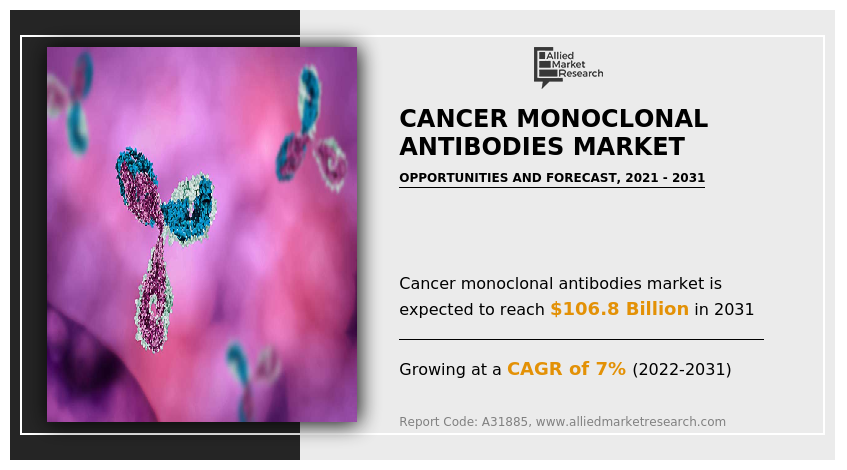
The disease is a medical condition in which some of the person's body cells multiply uncontrollably and spread to other body parts. Some common prevalent cancers among people are gastric cancer, colorectal cancer, breast cancer in women, and blood cancer. Since cancer is a genetic disease, it is usually inherited from one generation to another, but it can also occur through environmental factors such as chemical exposure, radiation exposure, and gene trigger.
Monoclonal antibody treatment is a type of immunotherapy in which monoclonal antibodies bind to specific proteins or cells due to their monovalent affinity. These antibodies can also bind to a specific antigen when given owing to their site specificity. As monoclonal antibodies are useful for detecting or purifying chemicals, they have important applications in biochemistry, molecular biology, and medicine. Its significance in the healthcare business is expected to grow significantly during the forecast period. The use of cancer monoclonal antibody testing in treating chronic diseases requires more R&D, advancements in cancer monoclonal antibody market technologies produced biologically, and innovations that improve the efficacy and safety of the produced genes. This is also accompanied by improved demands from the medical sector, which requires more advanced techniques and skilled workers to carry out the procedures. Development in the cancer monoclonal antibody market, considerable gene use in developing novel vaccines, and an increase in investment from businesses are expected to help the market grow during the forecast period.
The difficulties in employing cancer monoclonal antibodies market growth techniques, as well as the high cost of the procedure in particular areas, are projected to limit their development, thereby hampering the cancer monoclonal antibody testing market share growth. Also, the high cost of cancer monoclonal antibody targeted therapy is likely to hinder the market growth by limiting the number of patients who can afford such expensive treatment procedures for cancer.
Strategic partnerships are helping companies in the cancer monoclonal antibody market to increase the innovation of their products. Companies are creating novel products and collaborating with other businesses to share knowledge and expertise in order to survive in the fiercely competitive industry. While businesses have historically worked together with academic and research organizations in this industry through partnerships and in- or out-licensing agreements, this trend has been accelerating in recent years. For instance, on January 20, 2023, Hematology-focused Disc Medicine, a pharmaceutical company agreed to pay $10 million to Mabwell Therapeutics, monoclonal therapeutics developing company, to develop and commercialize an extensive portfolio of monoclonal antibodies for blood disorders, most importantly blood cancer.
The key players profiled in this report include F. Hoffmann-La Roche Ltd., Bristol Myers, Squibb Co., Merck & Co., GlaxoSmithKline plc, Johnson & Johnson, Amgen, Inc., Novartis AG, AstraZeneca plc, Eli Lilly and Company, and AbbVie.
The cancer monoclonal antibody market is segmented on the basis of antibody type, application, end user, and region. By antibody type, the market has been divided into murine, chimeric, and humanized. By application, the market has been classified into blood cancer, breast cancer, lung cancer, and others. By end user, the market has been divided into hospitals & clinics and research & academic institutes/laboratories. By region, the market is analyzed across North America, Europe, Asia-Pacific, and LAMEA.
The cancer monoclonal antibodies market is segmented into End User, Antibody Type and Application.
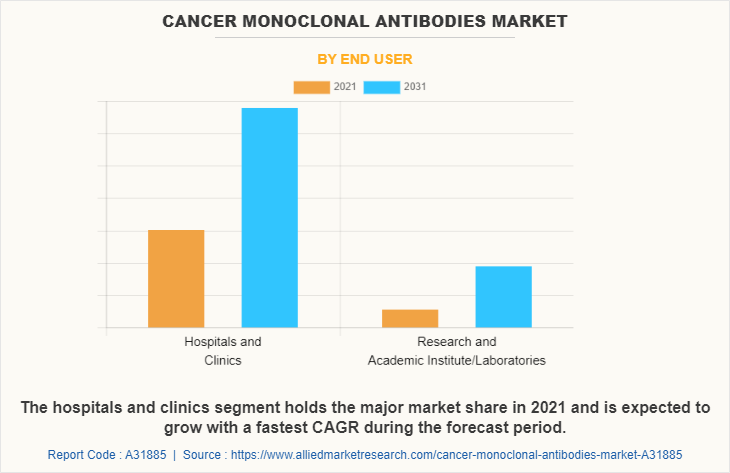
By end user, the hospitals & clinics segment had a dominant market share in 2021. Hospitals held the largest share of the market due to an increase in patients being admitted to hospitals for various chronic conditions. The availability of contemporary pharmacological therapy in settings has an impact on patient preference. The demand for cancer monoclonal antibody testing in hospitals is expected to be driven by highly skilled experts offering specific treatments for illnesses including autoimmune diseases and cancer. In addition, improving reimbursement practices for expensive therapies in hospitals will have an impact on the number of patient visits.
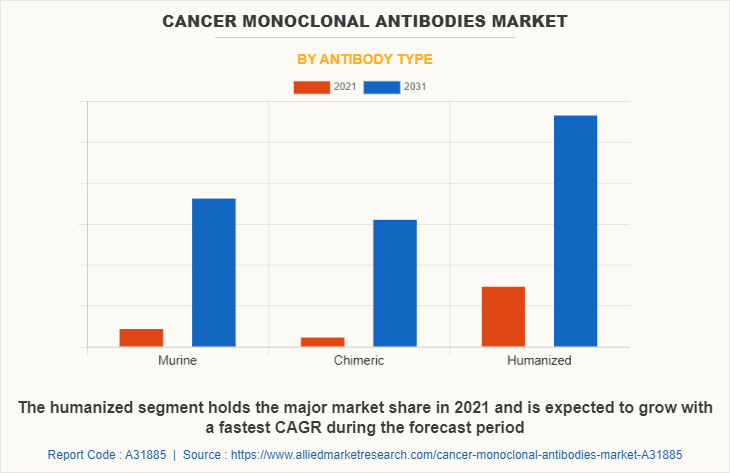
By antibody type, the humanized sub-segment is anticipated to have the fastest growth during the forecast period. The humanization of mouse monoclonal antibodies has been implemented widely, which has contributed to the market expansion. This is because mouse monoclonal antibodies are inexpensive, readily available, and produced quickly. Another potential growth driver for this market is the inventive genetic engineering technology used in its manufacturing. A number of humanized antibodies have now been created and are currently being tested in clinical trials. However, the human component is anticipated to expand the fastest during the forecast period. The segment growth is projected to be positively impacted by a rise in the number of human mAb product launches and approvals in the upcoming years.
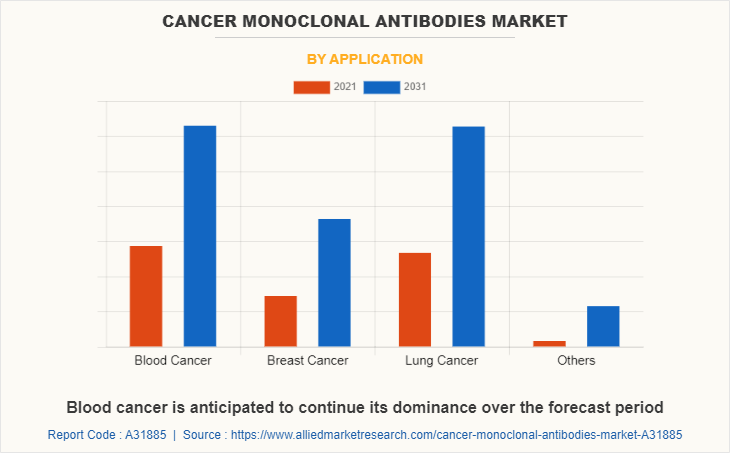
By application, the blood cancer sub-segment had a dominant market share in 2021. The increase in blood cancer cases among people, globally, has led to a rise in demand for cancer monoclonal antibody treatment. There has been tremendous growth in demand for hematological problem therapies over the last three years, encouraging pharmaceutical companies to produce innovative drugs such as cancer monoclonal antibodies.
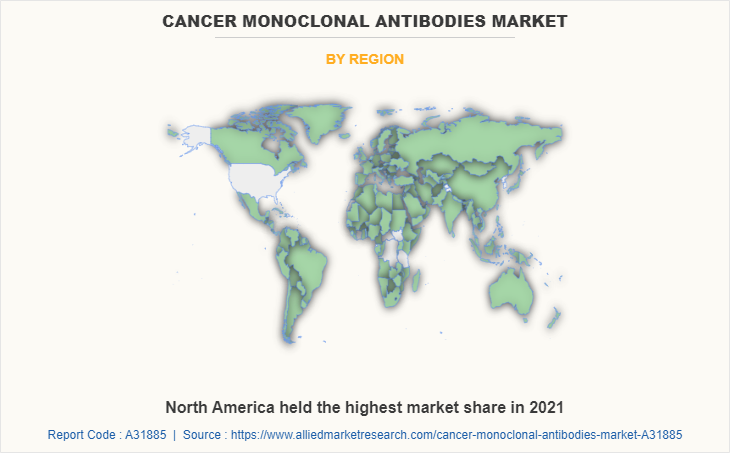
By region, North America cancer monoclonal antibodies market size accounted for a dominating market share in 2021. The regional market is expected to be driven by an increase in international and national collaborations among organizations, especially those in both developed and developing countries. For example, AbbVie and I-Mab signed a broad international collaboration agreement in September 2020, for the marketing and development of Lemzoparlimab, an advanced anti-CD47 monoclonal antibody discovered and produced by I-Mab for the treatment of numerous malignancies. The agreement also opens the way for future collaboration on CD47-associated therapeutic agents.
Impact of COVID-19 on Global Cancer Monoclonal Antibodies Industry
- The COVID-19 pandemic negatively impacted the cancer monoclonal antibody market as the hospitalization rate for infected patients increased during the COVID-19 pandemic owing to which the scope of hospitalization for patients for surgeries reduced significantly
- Owing to the increase in cases of hospitalization due to rising COVID-19 infection, healthcare professionals postponed cancer treatment as patients with cancer have low immunity and there are high chances that these patients may catch infection quickly
- The global pandemic has caused a significant reduction in demand for cancer treatments as the focus shifted to the management and control of the COVID-19 outbreak. Therefore, there has been a decline in the number of cancer cases diagnosed, leading to a decline in demand for cancer monoclonal antibody testing.
Key Benefits For Stakeholders
- This report provides a quantitative analysis of the cancer monoclonal antibodies market share, segments, current trends, estimations, and dynamics of the cancer monoclonal antibodies market analysis from 2021 to 2031 to identify the prevailing cancer monoclonal antibodies market opportunities.
The report provides an exclusive and comprehensive analysis of the global cancer monoclonal antibody testing market trends along with the cancer monoclonal antibodies market forecast.
- The market research is offered along with information related to key drivers, restraints, and opportunities.
- Porter's five forces analysis highlights the potency of buyers and suppliers to enable stakeholders make profit-oriented business decisions and strengthen their supplier-buyer network.
- In-depth analysis of the cancer monoclonal antibodies market segmentation assists to determine the prevailing cancer monoclonal antibodies market opportunity.
- Major countries in each region are mapped according to their revenue contribution to the global market.
- Market player positioning facilitates benchmarking and provides a clear understanding of the present position of the market players.
- The report includes the analysis of the regional as well as global cancer monoclonal antibodies market trends, key players, market segments, application areas, and market growth strategies.
Cancer Monoclonal Antibodies Market Report Highlights
| Aspects | Details |
| Market Size By 2031 | USD 106.8 billion |
| Growth Rate | CAGR of 7% |
| Forecast period | 2021 - 2031 |
| Report Pages | 300 |
| By End User |
|
| By Antibody Type |
|
| By Application |
|
| By Region |
|
| Key Market Players | Bistrol-Myers Squibb, Johnson & Johnson, AstraZeneca plc, Roche Holdings Ltd, Eli Lilly & Co., Abbvie Inc, Celgene Limited, Merck & Co. Inc., Pfizer Inc., Novartis AG |
Analyst Review
Rise in the prevalence of cancer among people, globally, is expected to drive the global cancer monoclonal antibody testing market growth during the forecast period. Also, the increase in demand for effective treatment and management of cancer has initiated research activities for developing effective solutions for cancer management. These factors are likely to drive the cancer monoclonal antibody testing market growth in the future. However, the cancer monoclonal antibody testing market growth is expected to restrain owing to the high cost of the procedure and less availability of skilled labor for antibody testing. Researchers across the globe are conducting extensive research to develop successful cancer monoclonal antibodies against different cancers, which is expected to create several growth opportunities for the key players operating in the market during the forecast period.
Among the analyzed regions, North America dominated the global market in 2021 and Asia-Pacific is anticipated to have the fastest growth during the forecast years. The growth is majorly attributed to the presence of established and technically advanced research institutes and centers for conducting cancer research in the regions.
Cancer monoclonal antibody testing market share growth is expected to be driven by the rise in cancer incidences worldwide during the forecast period. Greater government support for cancer monoclonal antibodies through increased financing and improved reimbursement policies to allow ordinary people to benefit from newly developed cancer treatment helps in accelerating the market for cancer monoclonal antibody testing in response to rising demand.
The major growth strategies adopted by the cancer monoclonal antibody testing market players include investment and agreement.
The hospitals & clinics segment of the end user acquired the maximum share of the global cancer monoclonal antibody testing market in 2021.
Researchers and scientists are potential customers in the cancer monoclonal antibody testing market.
The report provides an extensive qualitative and quantitative analysis of the current trends and future estimations of the global cancer monoclonal antibody testing market from 2021 to 2031 to determine the prevailing opportunities.
North America is expected to provide more business opportunities for the global cancer monoclonal antibody testing market in the future.
F. Hoffmann-La Roche Ltd., Bristol Myers, Squibb Co., Merck & Co., GlaxoSmithKline plc, Johnson & Johnson, Amgen, Inc., Novartis AG, AstraZeneca plc, Eli Lilly and Company, and AbbVie are the major players in the cancer monoclonal antibody testing market.
Loading Table Of Content...



